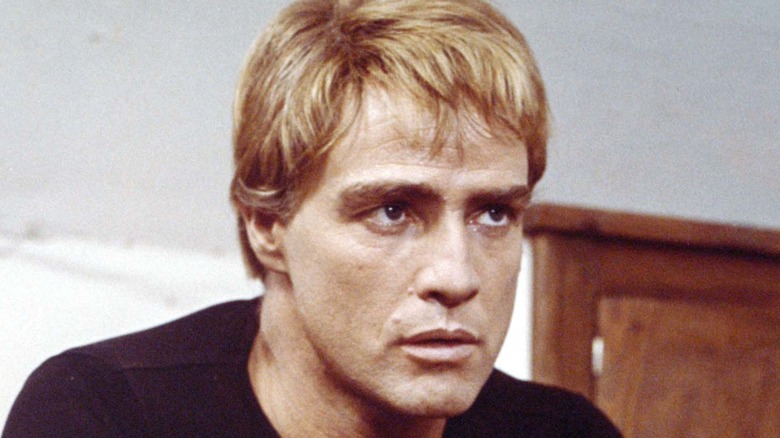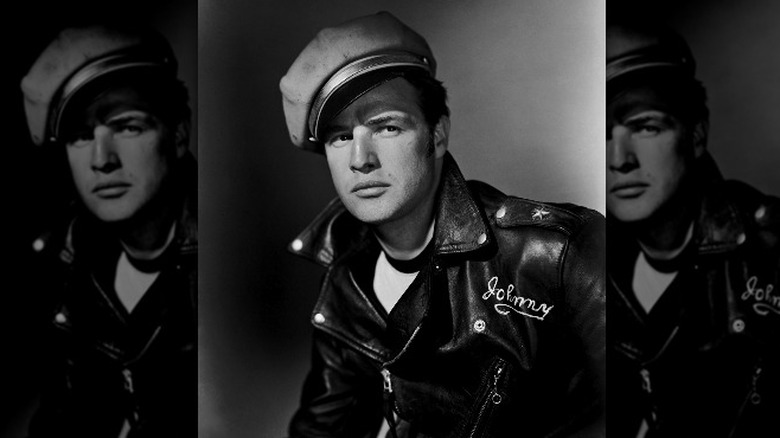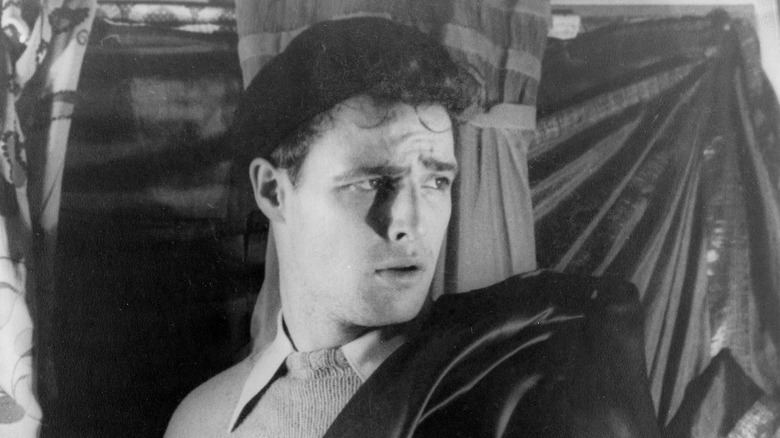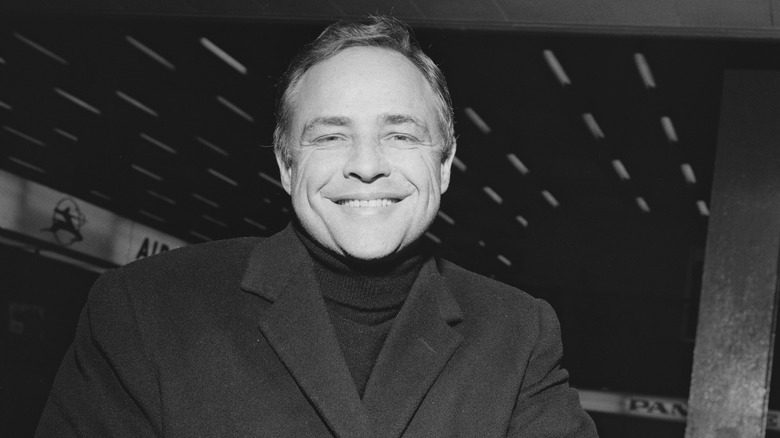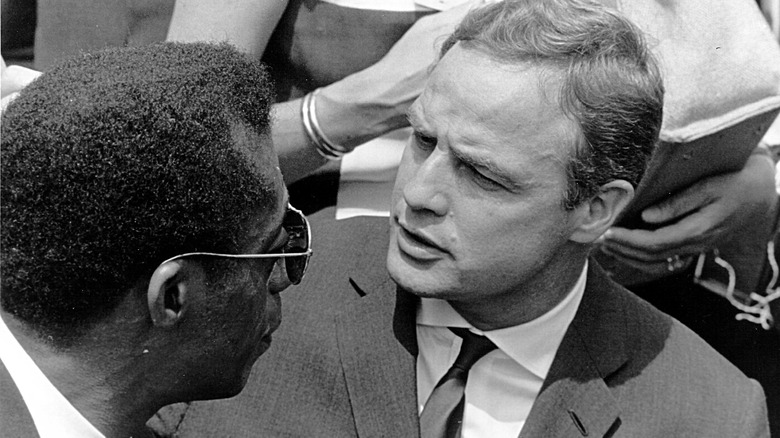5 Reasons Why Marlon Brando Was Ahead Of His Time
The Hollywood career of Marlon Brando (1924-2004) lasted more than half a century, with the former stage actor continuing to work through one of the most turbulent and transformative periods of cinema history. Voted Broadway's Most Promising Actor in 1946 for his role in Maxwell Anderson's play "Truckline Cafe" (per Biography), the actor's startling progression to the silver screen was heralded by some of the medium's most memorable performances, including that of Stanley Kowalski in Tennessee Williams' "A Streetcar Named Desire," which Brando had first performed on stage, according to History. In contrast, by the late 1990s, Brando's reputation had suffered due to eccentrically poor performances in such films as "The Island of Dr. Moreau," for which he won a Golden Raspberry Award for Worst Supporting Actor (per Collider).
However, despite a checkered career, there are many reasons that Brando endures, not least the iconic roles throughout his life which righted his at times ailing career. For audiences today, his performance as Vito Corleone in Francis Ford Coppolla's 1972 classic "The Godfather" is perhaps his most well-known, while his later supporting roles in movies such as "Apocalypse Now," as well as much of his early work, remain classics of 20th century cinema. Brando, almost a century on from his birth, remains a thoroughly modern actor, even today.
Style influence
Though his acting talents were never in doubt, much of Marlon Brando's breakout appeal arguably came through what he represented to young audiences who first encountered his work in the 1950s. Following his breakout performance in "A Streetcar Named Desire" — for which Brando was nominated for an Academy Award–– and his performance in 1952's "Viva Zapata!," a movie based on the life of the Mexican revolutionary Emiliano Zapata, Brando took the leading role of Johnny Strabler in "The Wild One," the 1953 classic that depicted one of mid-20th century America's most sensationalized fascinations: outlaw motorcycle gangs. The movie caused a scandal, and was banned in Britain until 1968 (per Britannica).
As Strabler, Brando came to personify an attitude that would influence generations of performers across the arts, and lead countless young people from America and beyond to embrace non-conformism or, as the movie's critics would put it, nihilism. As the American film critic Pauline Kael wrote in The Atlantic back in 1966: "He was our angry young man — the delinquent, the tough, the rebel — who stood at the center of our common experience." Just a decade and a half into his career, those who knew his work were already beginning to measure his impact.
Superficially, this attitude was heralded by a look that would influence the world's biggest musicians, including Elvis Presley, and Brando's rebellious style still resonates today. Los Angeles Magazine once claimed: "Brando was rock and roll before anybody knew what rock and roll was" (via British Pathé).
Acting style
But Marlon Brando's biggest contribution to cinema was his way of acting, a style that was both critically admired and viciously opposed in its shocking newness. Brando pioneered what has become known as "method acting" for the screen.
According to Britannica, Brando moved to New York in 1943, where he enrolled at the Drama Workshop. He was taught by Stella Adler, a legendary acting teacher whose technique was derived from the system proposed by the Russian actor Konstantin Stavinslavsky (via Britannica). The Stavinslavsky method teaches actors to evoke their own emotional experiences to provide authentic responses to their character's desires and motivations and to portray them naturally and convincingly. Or, as it has become broadly understood in popular culture, method acting invites actors to "lose themselves" in the characters they portray.
Brando's role in "A Streetcar Named Desire" is now widely credited as the first on-screen use of the technique, which previously had been the preserve of stage actors, according to Collider. Today, some of the biggest names in cinema are known as "method actors," including Robert De Niro, Daniel Day Lewis, and Christian Bale (via The Cinemaholic). But even in Brando's day, the technique had its detractors. Frank Sinatra, who had a long-running feud with Brando as well as his own Academy Award, famously once said that he had no truck with "that method crap" (via Mental Floss).
Even today, such techniques remain controversial. In a recent interview, Martin Freeman slammed the technique as "self-aggrandising, selfish, narcissistic," while many critics believe that actors court the term "method actor" to allow for unchecked self-indulgence on set (via The Conversation).
Openness about his sexuality
But Marlon Brando was also groundbreaking off the silver screen, for a number of reasons. One of these was the incredible openness with which he discussed his sexuality, a dangerously taboo subject for much of the 20th century, especially as Brando made no effort to hide his bisexuality.
Speaking to a French journalist Gary Carey, who wrote the authorized biography "Marlon Brando: The Only Contender," Brando demonstrated his ease with sharing his own sexual identity, claiming, "Homosexuality is so much in fashion, it no longer makes news. Like a large number of men, I, too, have had homosexual experiences, and I am not ashamed. I have never paid much attention to what people think about me" (via Google Books). Such openness paved the way for gay actors in an industry that for decades previously required them to stay closeted, at least in the public eye.
In 2018, Brando once more hit the headlines after the musician Quincy Jones claimed in an interview that Brando had affairs with a string of secretly bisexual celebrities, including Marvin Gaye and Richard Pryor, though the claims were contested (via People).
Activism
Off screen, Marlon Brando was a tireless advocate for social change, both inside Hollywood and in the wider world. In his own industry, Brando shone a spotlight on the mistreatment of Native Americans by rejecting his 1973 Oscar for his role in "The Godfather," sending instead a Native American activist, Sacheen Littlefeather, in his place. Per The Guardian, Littlefeather took to the podium in place of Brando, and in front of an audience of millions chastised the American film and TV industry and an ongoing violent clash at Wounded Knee, before hoping that "in the future, our hearts and our understandings will meet with love and generosity."
Many in the industry, including John Wayne, were furious, though Brando stood by his decision in an interview on "The Dick Cavett Show" later that year, claiming: "I felt that it was a marvelous opportunity for an Indian to be able to voice his opinion ... he had a right to, in view of what Hollywood has done to him" (via YouTube). Brando explained that his intention was to challenge the stereotypical portrayal of "savage" Native Americans, arguing that such portrayals give Native American children a lifelong "negative image of themselves."
Brando was also a committed supporter of the Civil Rights movement. Alongside figures such as James Baldwin (pictured) and Charlton Heston, the actor was an active part of the March on Washington for Jobs and Freedom in 1963, and was present for Martin Luther King Jr.'s famous "I Have a Dream" speech, per Variety.
Environmentalism
Today, environmentalism is a hot button topic, with more people than ever actively engaged in finding solutions to combat climate change and to better care for our natural world. In Marlon Brando's day, such ideas weren't so mainstream, but the actor nevertheless championed many green causes, as well as animal rights.
After filming "Mutiny on the Bounty" near Tahiti in 1963 and marrying his Tahitian co-star Tarita Teriipaia, Brando bought his own atoll in French Polynesia named Tetiaroa (pictured), which, per Los Angeles Magazine, he envisaged becoming a wildlife sanctuary. Today it still operates as an a fully self-sustained eco-resort, according to the BBC.
But according to Susan Mizruchi, an English professor at Boston University who wrote the 2014 biography "Brando's Smile," the actor also considered the island a place to experiment with aqua farming, and saw the possibilities of developing new techniques to farm tilapia to alleviate world hunger (via Los Angeles Magazine).
